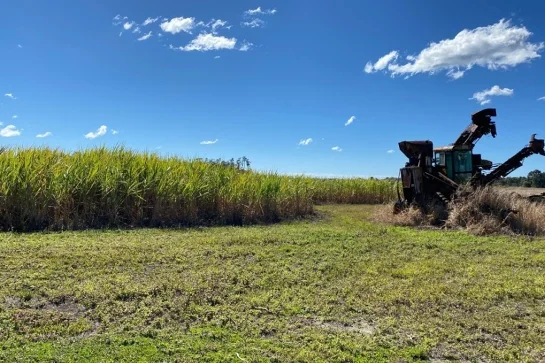Results at a glance:
■ Tasmanian farmer sentiment has declined from early-year highs
■ Confidence shaken by concerns about the impact of COVID-19 on overseas markets and commodity prices
■ Business investment still strong thanks to good seasonal conditions
The impact of COVID-19 on agriculture and commodity markets has put a dent in business confidence among Tasmania’s farmers, the latest Rabobank Rural Confidence Survey has revealed.
Tasmanian farmer confidence has fallen from the highs recorded earlier this year with only 14 per cent of the state’s agricultural producers now expecting business conditions to improve in the coming year, down significantly from the 40 per cent with that view in March.
In a sign of how quickly prospects can change, farmers cited concerns over commodity prices, overseas markets and COVID-19 as the reasons behind the drop in confidence – factors not mentioned at all as concerns in the previous survey.
However, favourable seasonal conditions are being enjoyed in most parts of Tasmania, helping temper the impact the coronavirus fallout is having on overall confidence.
And while short-term uncertainty is dominating the immediate outlook, the good season in Tasmania is underpinning longer-term confidence with one third of farmers still looking to increase on-farm investment in the coming year, according to the latest quarterly survey results.
The fall in sentiment takes the gloss off what had been a stellar start to the year for the state’s farmers thanks to a timely alignment of good seasons and strong commodity prices.
Rabobank rural manager Tasmania, Gareth Horne said while it has been business as usual for many producers throughout the COVID-19 lockdown, there has been some broader concern about the virus’ impact on commodity markets.
However, Mr Horne said, the mood among the state’s farmers was still upbeat, with the season now “very good to amazing” across most of Tasmania, helping sustain some longer-term optimism for the farm sector.
“Farmers across Tasmania have enjoyed mild temperatures, good rain and good growing days throughout autumn and, even with the COVID outbreak, the prices for our primary commodities are, at the moment, still pretty solid,” he said.
“Milk prices have been unaffected and the dairy season has been nothing short of sensational, and beef producers are in a pretty positive space, however those sectors are waiting to see what happens in the months ahead on global markets.
“Wool producers have been the hardest hit in our region, with prices softening significantly over the past 12-month period, and farmers really don’t know where prices will go, which is fuelling some uncertainty there.”
Mr Horne said there have been some localised factors which may also be contributing to the subdued confidence. A wetter-than-average autumn had created some difficulties for the recent potato harvest on the state’s north coast, while a wholescale review of opium requirements could see a significant reduction in the area sown to poppies – by as much as 40 per cent – a big blow given poppies were a popular cash crop for many farmers.
The latest survey – completed last month and conducted during the height of COVID-19 restrictions – found confidence was down across the board and particularly subdued in the state’s mainstay beef and dairy sectors.
Overall, while the number of Tasmanian farmers expecting business conditions to improve in the coming 12 months had declined significantly, 46 per cent now expected conditions to remain the same (compared with 25 per cent at the start of the year). The percentage expecting business conditions to deteriorate remained relatively stable, at 29 per cent.
In dairy, the percentage of farmers expecting conditions to improve fell back 20 per cent (from 50 per cent in the March quarter), while 30 per cent of dairy producers surveyed now expect conditions to worsen (up from 10 per cent).
Only a small number of beef producers expressed an optimistic view on the year ahead in the latest survey – 10 per cent compared with 50 per cent in the previous quarter – while 40 per cent expect conditions to worsen. Half of the beef respondents are expecting business conditions to remain the same.
Sentiment has also dropped among sheep producers, with no graziers expecting an improvement in conditions in the coming year, largely due to lower wool prices, and almost two thirds (63 per cent) expecting little change in business conditions.
While the state’s farmers may be concerned about the potential impacts of the coronavirus pandemic on business, the survey indicated the effect to date had been limited.
Specifically questioned in this survey about the effect COVID-19 and the restrictions to stop its spread has had on their farm businesses, two-thirds of Tasmanian farmers indicated they had not seen any negative impact. For the 31 per cent whose business had been impacted, this was in areas such as wool prices, ability to obtain supplies (or their cost) and operational difficulties arising from social distancing.
Impacts have been most pronounced in the sheep sector, with 63 per cent of Tasmanian sheep producers reporting the pandemic has had some negative impact on their business.
The latest survey also reveals the state’s farmers are revising down their expectations for farm income over the coming year from previously high levels, although 94 per cent of Tasmanian farmers surveyed are continuing to report their businesses are viable.
Those expecting their gross farm income to increase in the year ahead fell back to 25 per cent this survey (from 37 per cent previously) while 41 per cent expect a similar financial result to last year, the same as the last survey. The number of farmers expecting a weaker financial performance has risen to 34 per cent, compared with 23 per cent in March.
Mr Horne said while farm incomes this year may not be where farmers first thought, there was nonetheless an underlying confidence in the Tasmanian agricultural sector which farmers were demonstrating with ongoing investment both on and off the farm.
He said there were a number of property transactions in the past quarter and many farmers still expressing interest in buying properties to expand or complement existing operations.
Meanwhile the trend to invest in joint government and industry irrigation systems and schemes to deliver high-surety water across the state was also continuing, he added, and expected to come online by 2024/25.
The survey found one third of the state’s farmers intend to increase business investment in the coming year, slightly up from last quarter and above the national average (25 per cent). A further 57 per cent intend to maintain investment at current levels.
Of the farmers intending to increase investment this year, half have identified irrigation and water infrastructure as the leading priorities. Other improvements like fences and yards are also a key priority, while 29 per cent are looking to expand their enterprise.
The survey noted larger farm businesses (with gross farm income above $1 million) were particularly seeking to ramp up their investment, with 50 per cent intending to increase investment over the coming year, and 44 per cent earmarking additional property.
A comprehensive monitor of outlook and sentiment in Australian rural industries, the Rabobank Rural Confidence Survey questions an average of 1000 primary producers across a wide range of commodities and geographical areas throughout Australia on a quarterly basis.
The most robust study of its type in Australia, the Rabobank Rural Confidence Survey has been conducted since 2000 by an independent research organisation. The next results are scheduled for release in September 2020.








